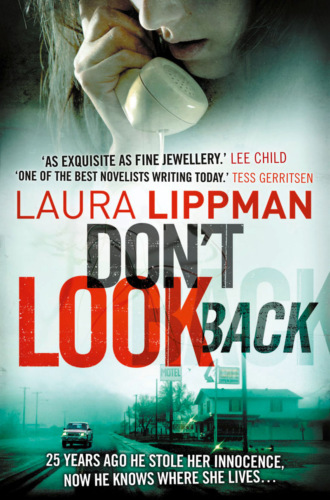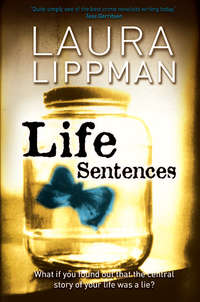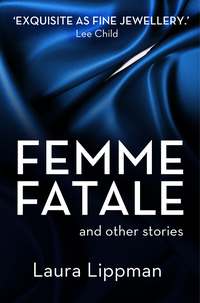
Полная версия
Don’t Look Back
Yours, Walter
And then – just in case she didn’t remember the full name of the man who had kidnapped her the summer she was fifteen and held her hostage for almost six weeks, just in case she might have another acquaintance on death row, just in case she had forgotten the man who had killed at least two other girls and was suspected of killing many others, yet let her live, just in case all of this might have slipped her mind – he added helpfully:
(Walter Bowman)
Chapter Two
1984
Walter Bowman was good-looking. Anyone who said otherwise was contrary, or not to be trusted. He had dark hair and green eyes and skin that took a tan well, although it was a farmer’s tan. He wasn’t a farmer, actually, but a mechanic, working in his father’s garage. Still, the result was the same, as far as his tan went. He would have liked to work with his shirt off on warm days, but his father wouldn’t hear of it.
He was good-looking enough that his family teased him about it, as if to make sure he wouldn’t get conceited. Yes, he was a little on the short side, but so were most movie stars. Claude, at the barbershop, had explained this to him. Not that Claude compared Walter to a movie star – Claude, like his family, like everyone else in town, seemed intent on keeping Walter in his place. But Claude mentioned one day that he had seen Chuck Norris at a casino in Las Vegas.
‘He’s an itty-bitty fella. But, then, all movie stars are little,’ Claude said, finishing up. Walter loved the feel of the brush on the back of his neck. ‘They have big heads, but small bodies.’
‘How little?’ Walter had asked.
‘The size of my thumb,’ Claude said.
‘No, seriously.’
‘Five seven, five eight. ’Bout your size.’
That was what Walter wanted to hear. If Chuck Norris was about his size, well, that was almost the same as Walter being like Chuck Norris. Still, he needed to make one small clarification for the record.
‘I’m five nine. That’s average height for a man, did you know that? Five nine for a man, five four for a woman.’
‘Is that the average,’ Claude asked, ‘or the median? There’s a difference, you know.’
Walter didn’t know the difference. He might have asked, but he suspected Claude didn’t really know either, and all he would get was Claude making fun of his ignorance.
‘Average,’ he said.
‘Well someone has to be average,’ said Claude, who was tall, but skinny and kind of pink all over – splotchy skin, pale, pale red hair, watery eyes that were permanently narrowed from years of staring at the hair that lay across his barber scissors. Everyone was always trying to put Walter in his place, keep him down, stop him from being what he might be. Even women, girls, seemed to be part of the conspiracy. Because, despite Walter’s good looks, he could not find a woman who wanted to go with him, not even on a single date. He couldn’t figure it out. Things would start out okay, he could get a conversation going. He read things, he knew things, he kept an interesting store of facts at his disposal. Claude’s Chuck Norris story, for example, became one of his anecdotes, although he added his own flourish, holding his thumb and forefinger out to show just how ittybitty Chuck Norris was. That usually got a laugh, or at least a smile.
But then something would happen, he could never put his finger on what, and the girl’s face would close to him. It was a small town, and it soon seemed there wasn’t a girl in it who would consider going out with Walter Bowman. And on the rare occasion when a new family moved in, one with daughters, someone must have told them something, because they didn’t want to go with him either.
Then, one day, on an errand for his father, he saw a girl walking down the road just outside Martinsburg. It was hot, and she wore shorts over a lavender bathing suit, a one-piece. He liked that she wore a one-piece. Modest. He offered her a ride.
She hesitated.
‘Wherever you’re going,’ Walter added. ‘Door-to-door service. Truck’s air-conditioning is so cold, you’ll need a sweater.’
It was cold. He saw what it did to her breasts when she got in. They were large for such a short girl, not that he let his eyes linger. He looked only once.
‘Where you going?’ he asked.
‘The Rite Aid,’ she said. ‘I want to buy some makeup, but my mother says I can’t. It’s my money, isn’t it?’
‘You don’t need makeup.’ He meant it as a compliment, yet she flushed, balled up her fists as if to fight him. ‘I mean, you’re lucky, you look good without it, but you’re right. It’s your money, you should be able to do with it what you want.’ He couldn’t quite stop himself. Maybe that was the problem, that he just couldn’t stop talking soon enough. ‘Although you shouldn’t buy anything illegal with it, drugs or whatever. Just say no.’
She rolled her eyes. She was a girl, not as old as he had thought when he first picked her up. Maybe no more than fifteen, but she clearly considered herself more sophisticated than Walter. Was that it? Was that why girls like this were forever eeling away from him? There were some girls – plain, slow witted – who didn’t mind his company, but Walter couldn’t get interested in just anybody. He was good-looking. He should be with someone as good-looking or better-looking. Everyone knew that was how it worked. A beautiful woman could go with the ugliest man on the planet, but a man had to date above himself, or be shamed. He deserved someone special.
‘I smoke pot,’ this girl announced.
He didn’t believe her. ‘You like it?’
The question seemed to catch her off guard, as if that wasn’t the point, liking it or not liking it. ‘Yeah,’ she said, as if it were a guess. She probably didn’t know the difference between average or median either, although Walter did now. He had looked it up. He always looked things up when he didn’t know them. No one had to be stupid. Stupid was a choice. He was forever learning things. He knew all the US state capitals and he was working on world capitals.
‘What’s it like?’ he asked.
‘You don’t know?’
‘No, it’s not something I’ve gotten around to.’
‘You wanna find out? I got some in my purse.’
He didn’t, actually, but he wanted to stay in this girl’s company a while longer.
‘What’s your name?’ he asked.
‘Kelly. With a y, but I’m thinking of changing it to an i. There are three Kellys in my class at school. What’s your name?’
‘Walt.’ He had never called himself that, but why not try it out, change his luck. Within the hour, they were in a little cove off the river, and she was trying to show him how to smoke pot. She said he was doing it wrong, but he was doing it wrong on purpose, wanting to keep his wits about him. He didn’t believe in drugs or alcohol, but if he needed to pretend in order to spend time with this girl, Kelly, Kelli, whatever, he would. He found himself wishing she wore a two-piece. A one-piece, that wasn’t going to come off easily, it wasn’t something you could slip a girl out of, bit by bit. He knew he had to take it slow, but he couldn’t, he just couldn’t. She was lying on her stomach, on a long flat rock. He blew on her neck, thinking of Claude’s brush. She wrinkled her nose, as if a bug had landed on her. He tried to give her a back rub, but she shrugged his hand off. ‘No,’ she said. His hand returned, not to her shoulder blades this time, but between her legs. ‘Hey,’ she said. ‘Don’t.’ But she wasn’t quite as bossy and superior now. He tried to be sweet, kiss her neck, stroke her hair. He knew from magazines that foreplay was important to girls. But things just didn’t go the way they were supposed to. It was only later, when she was crying, that his mind began to catalog the possible outcomes – she would be his girlfriend, she would tell her parents, she would tell other girls, she might even tell the police, she was never going to stop crying – that he realized he had only one option.
‘How’d you get scratched up, Walter?’ his father asked at dinner that night.
‘Stopped to relieve myself on the side of the road, walked right into one of those prickly bushes along the highway,’ he said. If someone had seen his truck parked out on Route 118, that would explain it.
‘Sure took you a long time to find that fan belt.’
‘Like I said, I had to go all the way to Hagerstown, and they didn’t have one either. I ordered it.’
‘Coulda sworn Pep Boys in Martinsburg said they had what I wanted in stock.’
‘Nope, wrong size. People in those places, they’re just ignorant. No work ethic, no interest in customer service.’
That was all his father needed, and he was off to the races about the death of the small businessman.
By the weekend, the local news was full of stories about the missing girl, Kelly Pratt. She’d never get a chance to change her name now, Walter realized. A week went by, a month, a season, a year. He thought of her as Kelly Brat. He had showed her who was boss. It could have been nice, she shouldn’t have taken him down to the river to smoke pot, the pot was what screwed him up, he probably wouldn’t have been her first, and her just fourteen, according to the news stories. Slut. Druggie. The very fact that they never found her, that he didn’t get caught, that the police never came to speak to him, that no one came forward to say that they had seen Walter Bowman’s pickup parked on the hill above the river that day, that they never even searched near that part of the river – all those things proved he had been right to do what he did.
He found himself taking long drives on his days off, looking for other girls who might need a ride.
Chapter Three
‘Ha-ha,’ Peter marveled. ‘He actually wrote “ha-ha.”’
‘If it were an e-mail, if he had access to a computer, he probably would have put an emoticon there, the one that uses a semicolon to wink at you.’
Peter held the letter at arm’s length, although he was not the least bit farsighted, not yet. He was actually a year younger than she was. He inspected the letter as if it were a painting, an abstract portrait of Walter Bowman, or one of those 3-D prints that had been popular for a time. Examined up close, it was words, in that furious, fastidious purple ink. At a distance, it melted into a lavender jumble, an impressionistic sketch of heather-colored hills.
Peter had arrived home at seven thirty that evening, early for him these days, but Eliza had waited until the children went upstairs to tell him about the letter. She might have been able to reference it covertly, using a familiar code: the summer I was fifteen. Over the years, this had been used to explain any number of things. Her need to leave a film that had taken an unexpected plot turn, her disinclination to wear her hair short, although the style suited her better than this not-long, not-short, not-anything haircut. Come to think of it, they hadn’t used the code for some time, not since Peter returned to the States earlier this year and began house hunting on weekends.
‘The Victorian that you like, it’s near – well, one county over – from where Point of Rocks is,’ he had told her via Skype. ‘It’s about an hour out of the city, but on the commuter line and it’s really pretty up there. Lots of people do it. But I thought—’
‘You thought it would bother me. Because of the summer I was fifteen.’ They were meeting each other’s eyes, yet not meeting each other’s eyes. She could never quite master that part of Skype.
‘Yes.’
‘I’m not sure it would, but if you’re willing to commute, what about Roaring Springs, where I grew up?’
‘The trains on that line don’t run late enough, hon. And we’d have to have two cars, because I’d have to drive to the station.’
‘Oh.’ She still wasn’t sure why Point of Rocks was in contention but Roaring Springs was not. Wouldn’t he need to drive to the train station out there, too? ‘Well, I’d rather you had less of a commute, so if we can afford something closer in, something near a Metro line, that would be my choice.’
They could – barely – so they did, and that was that.
‘That stupid party,’ he said now, still studying the letter. ‘And you didn’t even want to go. It never occurred to me that we should worry about such things.’
‘Or me, to be fair. I didn’t want to go to the party because, well, I didn’t want to go to the party. I never thought – he never, all these years, made any overture to me, or even my parents or Vonnie, who are much easier to find, still being Lerners. Between taking your name and moving, first to Houston, then to London . . .’
Peter poured himself a glass of white wine and Eliza, as she sometimes did, took a sip. No, even as Peter upgraded the wines he drank, she still found the taste acidic, harsh. She preferred the Albie cocktail of fruit punch and seltzer.
‘So, he’s on death row, reading the party pages in Washing tonian—’
‘It’s almost funny. Almost.’
‘Are you going to write him back?’
They had been sitting on opposite ends of the sofa in the family room, her feet in his lap. Now she put his sweating wineglass on a coaster and curled up next to him, indifferent to how warm the room was, even with the house’s various window units droning away. She thought once again of the house in Roaring Springs, cool on the hottest summer nights with nothing more than window fans. Global warming? The fallacy of memory? Both?
‘I don’t know. And the very fact that I don’t know bothers me. I should be appalled, or angry. Which I am. But mainly, I just feel exposed. As if everyone knows now, as if tomorrow when I leave the house, people will look at me differently.’
Peter glanced at the letter, now lying on the old chest they used as a coffee table. ‘No reference to the kids.’
‘No. All he knows is that I have a prominent husband and a green dress. But it came to our address, Peter, from a Baltimore PO box. Someone did that for him. Someone else knows.’
‘A woman, I’m guessing. A woman with a purple pen. Walter’s sister?’
‘I doubt it. His family essentially cut all ties after his arrest. They didn’t even attend the trials.’
She pressed her face into his neck. He smelled of an aftershave that seemed particularly British to Eliza, crisp and citrusy. She wasn’t sure where it was made, only that Peter had started wearing it during their London years. Their growing-up years, as she thought of them, although two thirty-somethings with small children should have been much further along the road to being grown-ups. Peter’s jobs had always dictated their sense of themselves. When he was a reporter at the Houston Chronicle, they had felt young and bohemian, right down to the funky little house in Montrose. His jump to the Wall Street Journal had dovetailed with the arrival of the children, but they remained in Montrose, although minus the wild parties for which they had been known, parties famous for benign drunkenness and unexpected couplings. At least three marriages in their circle had started at one of their parties, and two had ended. It was as if Peter, with his serious, stuffy job at the Journal – not to mention a wife and children – needed to prove he was still a young man.
London changed that. They were certifiable grown-ups within months of arriving there, and Eliza wasn’t sure if that was because of Peter’s job, as bureau chief, or the city itself. Perhaps their newfound maturity was a result of the sheer distance from everything and everyone they had known. Now, back in the States, she felt old, on the verge of dowdy. Yet her own mother didn’t even have her first child until she was thirty-six and remained exuberantly youthful in her seventies. Maybe it was their old-fashioned roles – full-time mother, full-time breadwinner – that were weighing them down, making them middle-aged, out of touch.
‘I know this sounds odd, but I kind of forgot about Walter. That is, I forgot they were going to execute him. He never thought he would die that way.’
Peter shifted, redistributing her weight, moving her arm, which had left a damp stripe across the front of his shirt. ‘I don’t remember that in the letter.’
‘Then. The summer I was fifteen. I think he thought it would end in a slow-motion hail of bullets, like a movie. As opposed to a routine traffic stop at the Maryland line.’
Peter kissed the top of her head. His skin was warm, but then, it always was. Energy poured out of him, even when he was still.
‘I love you,’ he said.
‘I love you, too.’
‘You don’t know what love is.’
This was a joke, their own private call-and-response, so ingrained that Eliza couldn’t remember its origins, only that it always made her feel safe.
‘Gross.’ It was Iso, standing on the threshold. ‘Get a room.’ Eliza wondered how long she had been standing there, what she had heard and whether she could make sense of any of it. The summer I was fifteen, hail of bullets, routine traffic stop.
‘What do you need, baby?’ Eliza asked.
Iso made a face. Possibly because of the word baby, or possibly because the mere sound of Eliza’s voice irritated her. ‘I came down to remind you to wash my Spurs jersey, in case you forgot. I want to wear it tomorrow.’
‘I did. Wash it, that is. Not forget. But, Jesus, Iso, that jersey is made for damp England, not ninety-degree days in Montgomery County. Can’t you wear a T-shirt like the other kids?’
‘No. Did you wash my socks, too? I had to dig a pair out of the hamper this morning.’
‘Socks, too.’
‘You know,’ Peter put in, ‘if you can work an iPod and the television and the computer and TiVo, you could probably learn how to operate the washing machine, Isobel.’
Iso looked at him as if he were speaking Portuguese. Peter didn’t annoy her as much as Eliza, but she refused to acknowledge he had any power over her. She stalked off without a reply.
‘I don’t want them to know,’ Eliza said to Peter. ‘Not yet. That’s all I care about. Albie’s just gotten over those awful nightmares, and even Iso is more impressionable than she lets on.’
‘It’s your call,’ Peter said. ‘But there’s always the risk of someone else telling them. Especially as the execution draws closer.’
‘Who? Not you, not my parents. Not even Vonnie, volatile as she can be, would go against our wishes.’
Peter shrugged noncommittally, too polite to say that he considered his sister-in-law capable of just about any kind of bad behavior. It was funny how Peter and Vonnie, who had so much in common – similar intellects and interests, even some parallels in their career paths – remained oil-and-water after all these years. You say funny, Vonnie sneered in Eliza’s head, I say Freudian. He wanted a mommy, so he married one. Peter was more diplomatic about Vonnie: She’s a feisty one. You always know what’s on her mind.
Eliza pressed him for agreement: ‘No one else knows.’
‘Walter knows, Eliza. Walter knows, and he found you. Walter knows, and he might tell someone else. He has told someone else. The person who wrote the letter. Who clearly has our address, not that addresses are hard to find these days.’
‘Well, there’s no one – oh, shit. That asshole. That alleged journalist, Garrett. But I’m sure he’s moved on to other lurid tales, assuming he’s still alive. Is it a proper use of irony to say that it would be ironic if he died in some hideous, salacious crime?’
‘I don’t know if it would be irony, but it has a certain poetic justice.’
‘Walter never spoke to him, though. Not during the trial, and certainly not after that book. He probably disliked that book even more than I did.’
‘But his book is out there. Nothing really disappears anymore. Once, that kind of true-crime crap would be gone forever, gathering dust in a handful of secondhand bookstores, pulped by the publishers. Now, with online bookstores and eBay and POD technology, it’s a computer click away for anyone who remembers your original name. For all you know, he’s uploaded it to Kindle, sells it for ninety-nine cents a pop.’
Eliza wasn’t worried about computer clicks. But if she complained to the prison officials, that would be another set of people who knew definitively who she was and where she was. Why should she trust them? Better to ignore Walter, although she knew that Walter was most unpredictable when someone dared to ignore him. Only not where he was now, locked away. And usually not to her. The One Who Got Away, to borrow the hideous chapter heading from that nasty little book. As if she were a girl in a jazz ballad, a romantic fixation. The One Who Got Away. The one who was, as the book said repeatedly, ‘only raped, allegedly.’ Only. Allegedly.
Only a man who had never been raped could have written that phrase.
‘Let’s wait him out,’ she told Peter. ‘He’ll either drop this, or he won’t. As he said, he doesn’t have long. And he’s not being put to death for what he did to me.’
That night, in bed, she surprised Peter by initiating sex, quite good sex, with those little extras that long-married couples tend to forgo. It was, by necessity, silent sex, and she had to clap her hand over Peter’s mouth at one point, fearful that the children would hear him. But it was important to remind herself tonight that her body belonged to her, that this was sex, this was love. She deserved her life. She had created it, through sheer will and not a little help from Peter and her family. She had every right to protect it.
But as she fell asleep, spooned by her husband, the other girls came to her as they sometimes did. Maude and Holly, followed by all the faceless girls, the ones that Walter was suspected of killing, although nothing had ever been proven. Two, four, six, eight – the estimates climbed into the teens. They were, all things considered, remarkably kind and forgiving little ghosts. Tonight, however, they were mournful in their insistence that she was not alone in this, that they must be factored into any decision she made about Walter. Holly, forever the spokeswoman, reminded Eliza that her life was theirs, in a sense. Polite even to her phantoms, Eliza did not argue.
Eventually the others slipped away one by one, but Holly lingered in Eliza’s thoughts, keen on some private business. ‘I was the last girl,’ she said. ‘They shouldn’t have called you that. I was the last girl, and he’s going to die for what he did to me.’
‘Oh, Holly, what does it matter? Last or next-to-last? Ultimate or penultimate? They’re just words. Who cares?’
‘I do,’ Holly said. ‘And you know why, even if you always pretend that you don’t. Ha-ha!’
Chapter Four
1985
Point of Rocks. He had always liked that name, seen it on signs for years, but somehow never managed to visit. Now that he had – well, it wasn’t that much different from any of the towns along the Potomac. From his own town, in fact, back in West Virginia. Almost heaven, the license plate said, and Walter agreed. Still, he liked to drive, wished he could see more of the world.
When he was a child, no more than four or five, his father took him to a spot in Maryland, Friendsville, where it was possible to see three states – Maryland, West Virginia, Pennsylvania. He had been disappointed that the area wasn’t marked, like a map or a quilt, that one state was indistinguishable from another. He told his father he wished they could go out west, stand in the four corners, which he had heard about from his older sister.
‘If wishes were Mustangs,’ his father said. It was one of his favorite sayings. He didn’t believe in vacations. Years later, Walter felt a bit betrayed when he started working at his father’s repair shop and found out just how steady the business was. They could have taken trips, known a few more luxuries. Maybe not all the way west, but to that big amusement park in Ohio, the one with the tallest roller coaster in the world. Or his father could have sent Walter, his mother, and his sister on a vacation if he really felt he couldn’t close up for seven days, or leave the place under the care of one of his employees. The only trip Walter ever took was to Ocean City, Maryland, after high school graduation, and it felt like he spent more time on the bus than in the town itself.






